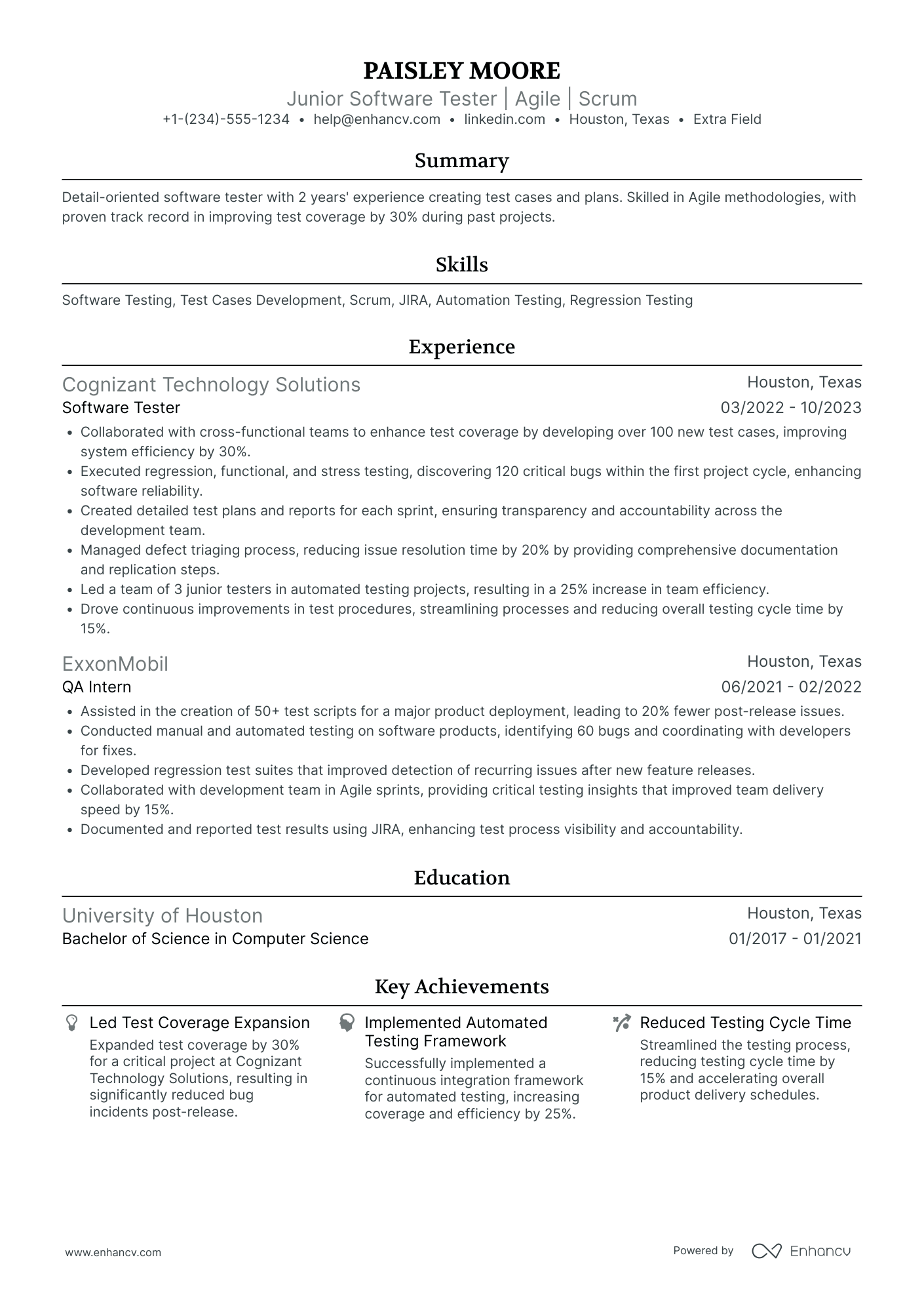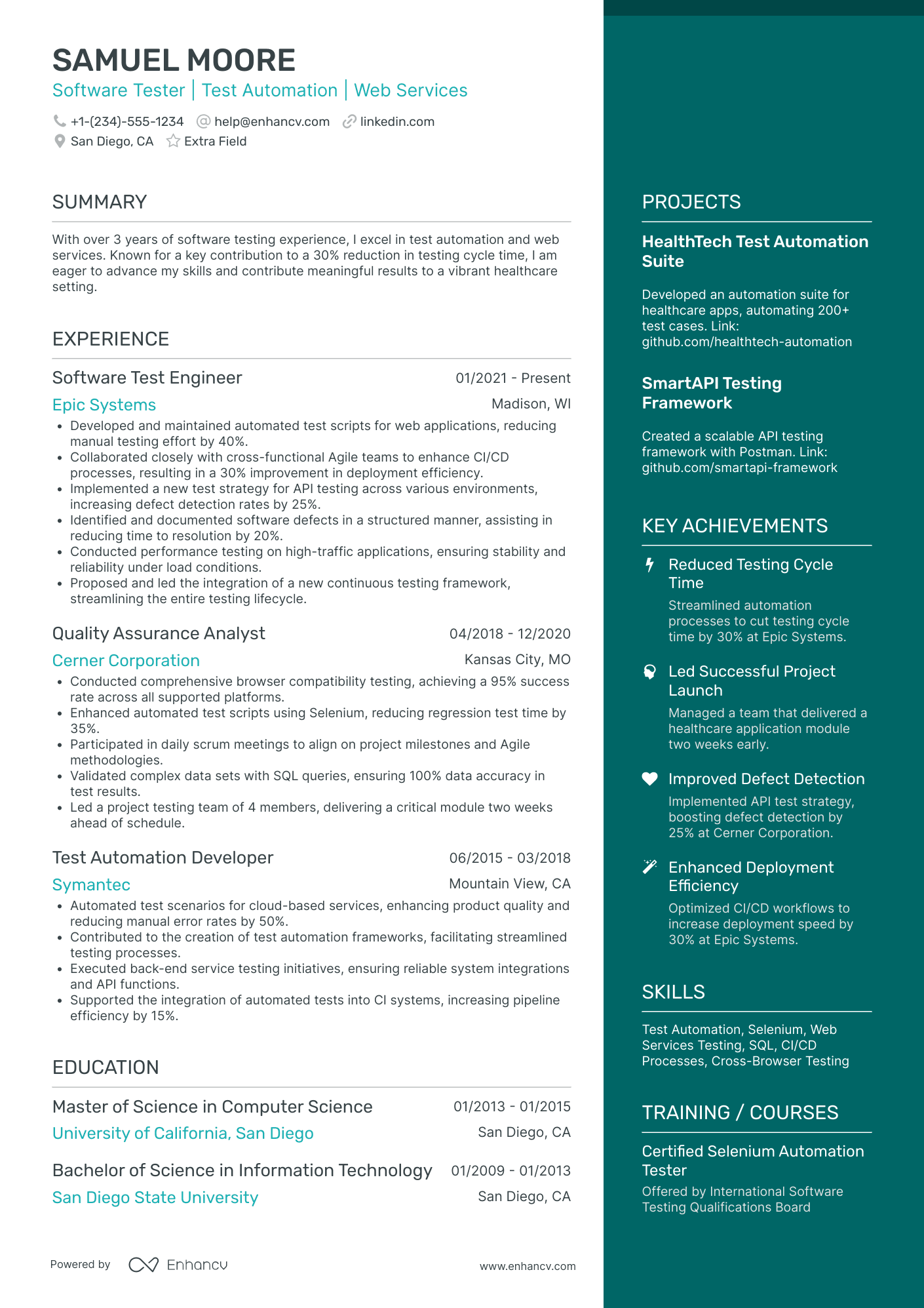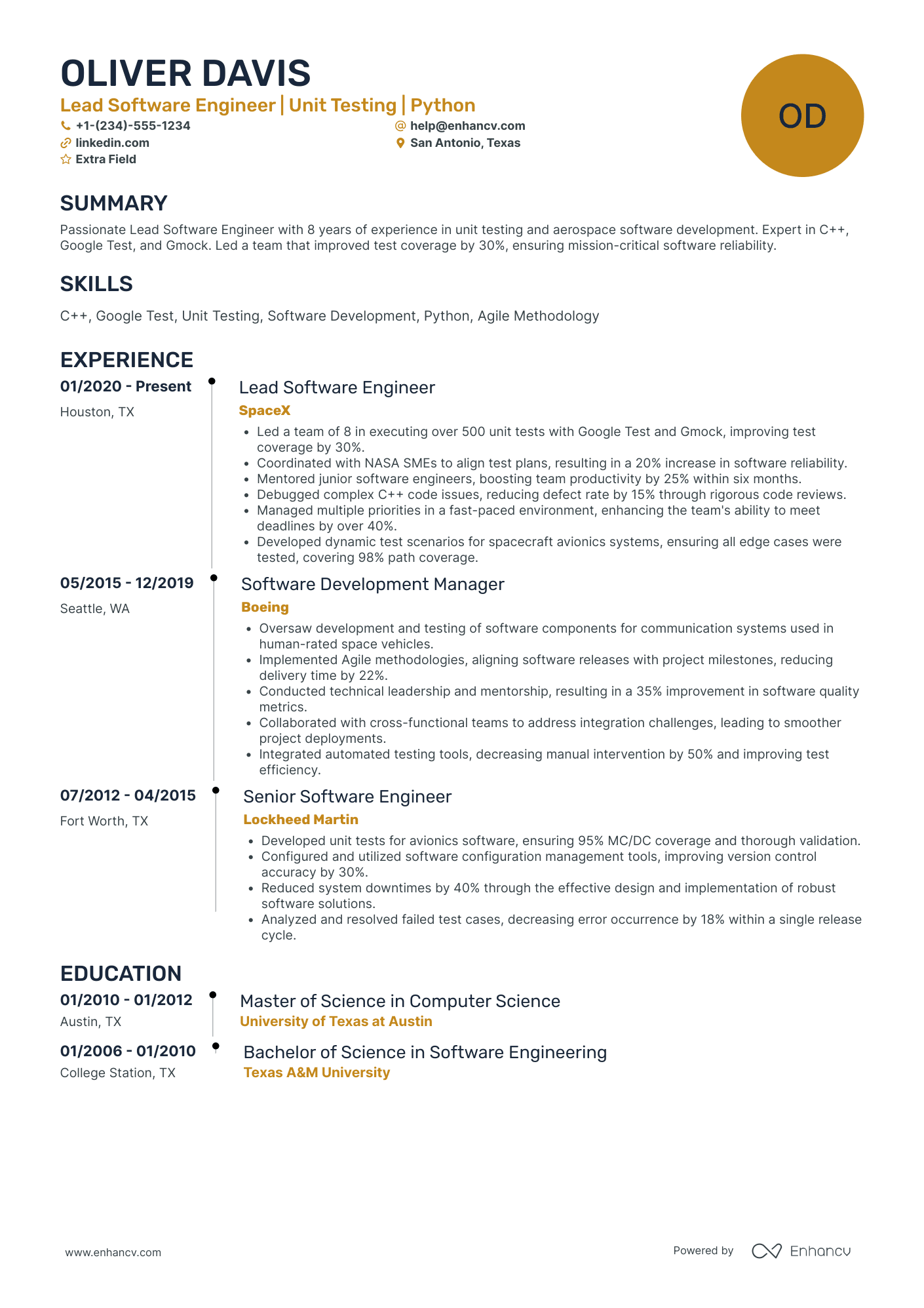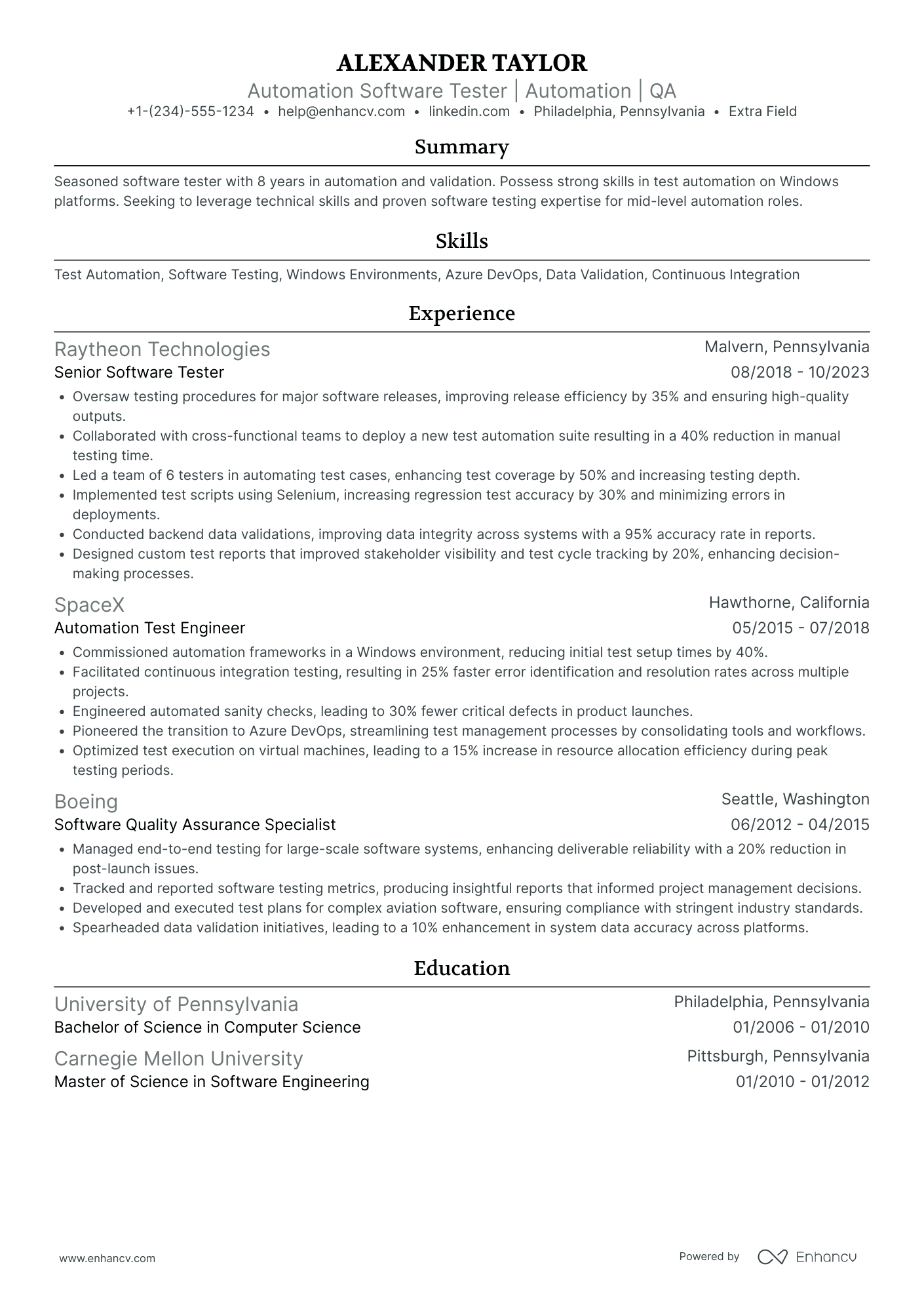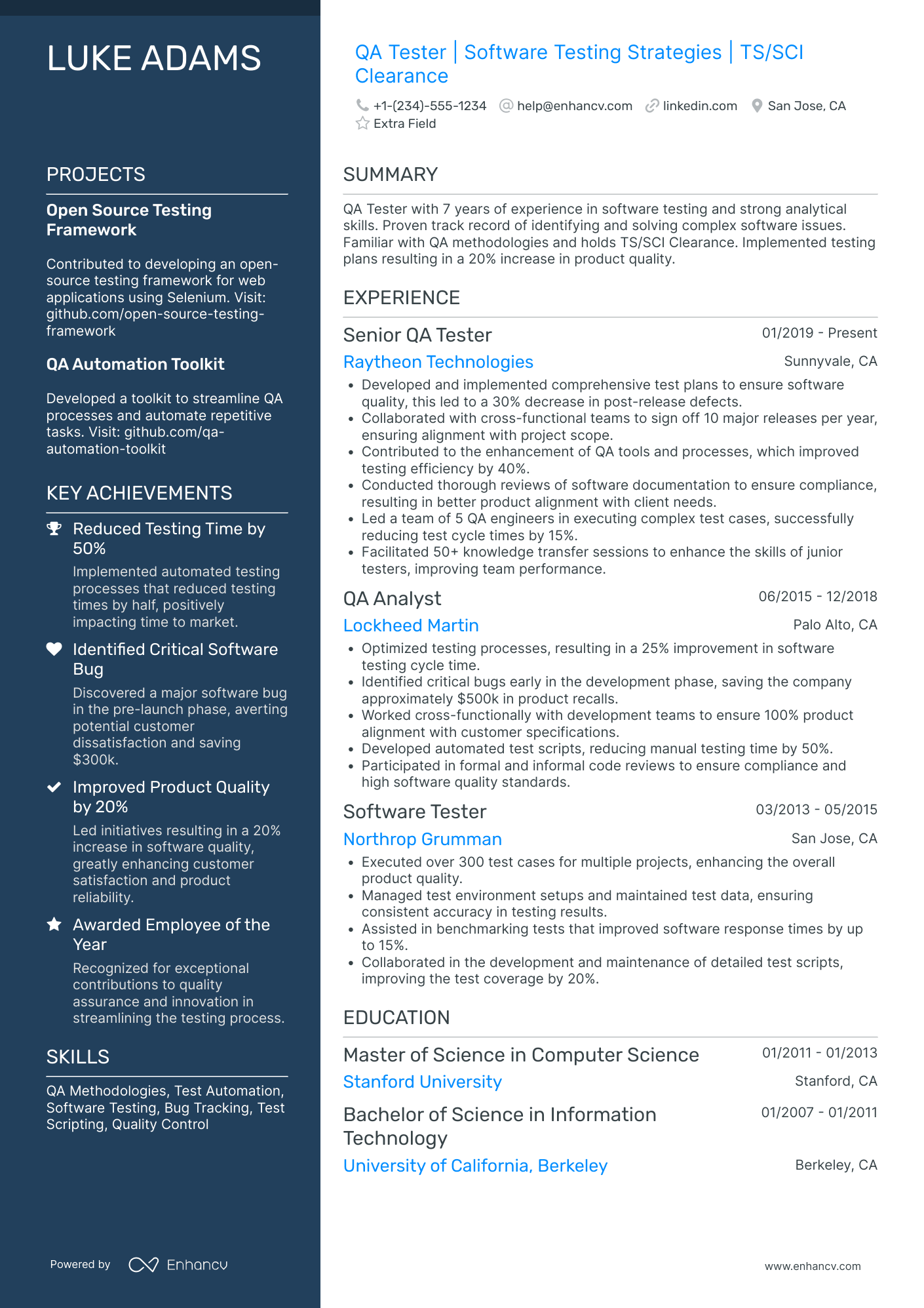One specific resume challenge you may face as a software tester is effectively showcasing your technical skills and experience in automation and manual testing processes. Our comprehensive guide provides strategies and examples to help you articulate your expertise, ensuring that your resume stands out to hiring managers.
- Software tester resume samples that got people hired at top companies.
- How to perfect the look-and-feel of your resume layout.
- How to showcase your achievements and skills through various resume sections.
- How you could hint to recruiters why your resume is the ideal profile for the job.
If the software tester resume isn't the right one for you, take a look at other related guides we have:
- Cisco Network Engineer Resume Example
- IT Specialist Resume Example
- Engineering Student Resume Example
- Development Manager Resume Example
- System And Network Engineer Resume Example
- Javascript Developer Resume Example
- IT Infrastructure Manager Resume Example
- Splunk Developer Resume Example
- Computer Technician Resume Example
- Angular Full Stack Developer Resume Example
How to style your software tester resume: layout and format
When creating your software tester resume, have you ever wondered how long it should be? Experts point out that it should be between one and two pages. Choose the longer format, if you happen to have over a decade of relevant experience. What is more, resume formats play a crucial role in presenting your experience. Use the:- Reverse-chronological resume format to highlight your experience;
- Functional skill-based resume format if you have less experience and want to focus on skills;
- Hybrid resume format to guide recruiters through both your experience and skills.
- Make sure your headline is simple and includes the job you're applying for or your current role, an abbreviation of a certificate you have, or even your professional area of interest;
- Always tailor your software tester resume to the role you're applying for by matching job requirements to your experience via different resume sections;
- Once you've created your resume, download it in PDF (unless otherwise specified). This is to ensure readability and that the layout remains fixed.
Think about the market’s preferences – a Canadian resume, for instance, could have a different layout.
Upload & Check Your Resume
Drop your resume here or choose a file. PDF & DOCX only. Max 2MB file size.
PRO TIP
If the certificate you've obtained is especially vital for the industry or company, include it as part of your name within the resume headline.
The five (plus) definite sections your resume for a software tester job should include are:
- Header with your headline, contact details, and/or a preview of your work
- Summary (or objective) to pinpoint how your success aligns with the role
- Experience with bullets of your most relevant achievements in the field
- Skills to integrate vital job requirements (both technical and personal)
- Your further dedication to the field, showcased via relevant higher education and/or certifications
What recruiters want to see on your resume:
- Demonstrated experience with various testing methodologies (e.g., manual/automated, black/white box, functional/non-functional testing).
- Familiarity with testing tools and software (e.g., Selenium, JIRA, TestRail, Postman).
- Understanding of software development lifecycle (SDLC) and the role of testing within it.
- Proficiency in writing clear and effective test cases and bug reports.
- Knowledge of programming/scripting languages relevant to test automation (e.g., Python, Java, C#).
Experts' advice on writing your software tester resume experience
While the excitement and motivation for writing your software tester resume was present in the first hour (or so), you now find yourself staring at the blank page.
The resume experience section is the one that allows you to make a memorable impression by matching job requirement with your past jobs and accomplishments.
To help you write this resume section, here are four mistakes you need to avoid:
- Listing every job you have had so far, including the irrelevant ones. Before that, consider each of your past roles based on relevancy to the role. It may be the case that the job you had 15 years ago may have taught you invaluable skills that are appropriate for the role;
- Including irrelevant work experience items. Those are past jobs that aren't linked with the role you're applying for (or so they seem). Consider how your past jobs will serve your professional presentation: will they be filling in a gap in your work history, or just taking up space?
- Focusing on responsibilities instead of accomplishments. Your software tester resume shouldn't just be telling recruiters what you did in the past - as it's most often the case that candidates have had similar responsibilities. But, rather, the experience section should showcase the success you've attained in each past role, thanks to your unique skill set;
- Consider listing just your professional experience. Any role you've had in the past - e.g. volunteering, internships, etc. - can make it into your software tester resume experience section. Make sure to include it alongside numbers and results.
Two more things you need to remember about your resume experience section.
The first are keywords. Or those specific job requirements that are crucial for the role . Ensure you've integrated them across your experience section to get sorted closer to the ideal candidate profile by the Applicant Tracker System (ATS).
The second are action verbs. Each of your experience bullets should start with a strong action verb, followed by your specific skill and your on the job achievements. Follow this formula to hint to recruiters what your unique value as a professional is.
Still with us? In the next section, we will show you how industry-leading professionals have avoided the four most common mistakes, while integrating keywords and action verbs in their experience section.
- Led the development and execution of test plans for the company's flagship e-commerce platform, improving test coverage by 40%.
- Automated regression and performance testing using Selenium and JMeter, reducing the manual testing effort by 50%.
- Collaborated with cross-functional teams to enhance product quality, resulting in a 30% decrease in post-release defects.
- Execute functional and user interface testing for iOS and Android banking apps, achieving a 99% pass rate across test cases.
- Identified critical security flaws, including a SQL injection vulnerability, leading to the implementation of more robust security protocols.
- Facilitated user acceptance testing with real users, incorporating feedback into the development cycle to enhance user satisfaction by 25%.
- Pioneered the adoption of continuous integration testing in a devops culture, ensuring 90% code coverage at all times.
- Conducted comprehensive backend testing for large-scale cloud storage systems, leading to a four-nines availability (99.99%) for the service.
- Enhanced automated test frameworks to include API and load testing, which bolstered the service reliability under peak traffic.
- Crafted and executed end-to-end test strategies for AI-driven analytics tools, improving the defect detection rate by 35%.
- Integrated advanced machine learning algorithms into our testing processes, reducing false positive errors by 28%.
- Managed a team of 5 to deliver timely releases for critical data insights projects, supporting the deployment of new customer-facing features every two weeks.
- Designed and maintained test cases for payment gateway solutions, directly resulting in a transaction success rate improvement from 96% to 99.5%.
- Performed intricate cross-browser testing for web-based financial dashboards, ensuring compatibility and seamless user experience across Chrome, Firefox, and Safari.
- Collaborated with developers and stakeholders to refine story criteria and improve the definition of 'done' for software deliverables.
- Orchestrated the quality assurance process for a SaaS platform, increasing system uptime to 99.8% and customer satisfaction by 20%.
- Optimized test suites and established a parallel testing mechanism which cut down the test execution time by 40%.
- Engaged with the product management team to create concise, clear, and actionable bug reports, leading to a 15% quicker bug resolution time.
- Handled all aspects of testing for a multiplayer gaming platform including performance, stress, and load testing on servers, ensuring a smoothened player experience during peak usage.
- Led a test automation initiative using Unity Test Tools, increasing automated test coverage from 30% to 70% within one year.
- Provided detailed test reports and feedback loops to enhance game mechanics, supporting developers in balancing and fine-tuning gameplay elements for user engagement.
- Implemented an agile testing framework to suit the rapid iteration environment of a startup, leading to a shorter time-to-market for a new fintech app.
- Conducted risk-based testing prioritizing major financial functionalities, which ensured a strong reputation for reliability amidst a competitive market launch.
- Engaged in thorough compliance testing to align with both GDPR and CCPA regulations, safeguarding the company against potential data privacy breaches.
Quantifying impact on your resume
- Include the number of test cases designed, executed, and managed to showcase your testing proficiency and thoroughness.
- Highlight the percentage of bugs or issues found that led to product improvements, demonstrating your attention to detail and impact on product quality.
- Specify the reduction in software release time or increased deployment frequency to indicate your efficiency in the testing lifecycle.
- Mention the amount of time or resources saved through automated testing practices to reflect your innovation and cost-saving abilities.
- State the number of testing tools mastered and their application in different projects to exhibit your technical versatility.
- Present the scale of the projects you have worked on, including user base or transactions handled, to signify your experience with high-stakes environments.
- Quantify your contribution to increasing test coverage by a certain percentage to highlight your commitment to comprehensive quality assurance.
- Detail the growth in user satisfaction or reduction in user-reported issues post-release to connect your testing effectiveness with customer experience improvements.
Action verbs for your software tester resume
Lacking relevant software tester resume experience?
Learn how to write your software tester resume experience in spite of having no real-world (or applicable) experience for the job.
You should:
- Feature relevant projects or publications that could impress recruiters or showcase that you have the basic skill set for the job
- Shift the focus towards your people (communication, organization, etc.) skills to demonstrate that you're a quick learner and can easily adapt to a new environment
- Use the resume objective to not only highlight your accomplishments but also map out how your career plans are perfectly aligned with the company's vision
- Select either the functional-skill-based resume format (that puts the focus on your skills) or the hybrid one (balancing expertise with skills).
Recommended reads:
PRO TIP
Showcase any ongoing or recent educational efforts to stay updated in your field.
Popular software tester hard skills and soft skills for your resume
Apart from assessing your professional expertise, recruiters are on the lookout for whether your skills align with the job.
Your profile would thus be assessed in regard to your:
- Hard or technical skills - your ability to perform on the job using particular technologies or software
- Soft skills - how you adapt, communicate, and thrive in different environments.
Both types of skills - hard and soft skills - are important for your resume, so make sure to create a dedicated skills section that:
- Lists up to five or six skills that align with the job advert.
- Integrates vital keywords for the industry, but also reflects on your personal strengths.
- Builds up further your skills with an achievements section within which you explain what you've achieved thanks to using the particular skill.
- Aims to always quantify in some way how you've used the skill, as it's not enough to just list it.
What are the most sought out hard and soft skills for software tester roles?
Check out the industry's top choices with our two dedicated lists below:
Top skills for your software tester resume:
Selenium
JIRA
TestNG
Postman
JUnit
LoadRunner
Git
SQL
Cucumber
SOAP UI
Attention to Detail
Analytical Thinking
Problem-Solving
Communication
Time Management
Team Collaboration
Adaptability
Critical Thinking
Creativity
Organizational Skills
PRO TIP
If you happen to have some basic certificates, don't invest too much of your software tester resume real estate in them. Instead, list them within the skills section or as part of your relevant experience. This way you'd ensure you meet all job requirements while dedicating your certificates to only the most in-demand certification across the industry.
Maximizing your software tester resume: education and certification sections
To effectively showcase your industry knowledge in your software tester resume, it's important to properly list your education and certifications.
For the education section, ensure you include:
- Higher education degrees pertinent to the industry or those at a postgraduate level;
- The start and end dates of your education, along with the name of the institution you graduated from;
- Your GPA and relevant coursework, but only if they are impressive and applicable to the role.
Additionally, create a separate certifications section to spotlight your most notable recognitions. Another excellent place to feature a leading industry certificate is in your resume header, right after your name.
Below is a list of key industry certifications that are often sought after by recruiters
The top 5 certifications for your software tester resume:
- Certified software tester (CSTE) - QAI Global Institute
- International Software Testing Qualifications Board Certified Tester (ISTQB CTFL) - ISTQB
- Certified Software Test Professional (CSTP) - International Institute for Software Testing (IIST)
- Certified Manager of Software Testing (CMST) - QAI Global Institute
- Certified Software Quality Analyst (CSQA) - QAI Global Institute
PRO TIP
List your educational qualifications and certifications in reverse chronological order.
Recommended reads:
Should you write a resume summary or an objective?
No need to research social media or ask ChatGPT to find out if the summary or objective is right for your software tester resume.
- Experienced candidates always tend to go for resume summaries. The summary is a three to five sentence long paragraph that narrates your career highlights and aligns your experience to the role. In it you can add your top skills and career achievements that are most impressive.
- Junior professionals or those making a career change, should write a resume objective. These shouldn't be longer than five sentences and should detail your career goals . Basically, how you see yourself growing in the current position and how would your experience or skill set could help out your potential employers.
Think of both the resume summary and objective as your opportunity to put your best foot forward - from the get go - answering job requirements with skills.
Use the below real-world software tester professional statements as inspiration for writing your resume summary or objective.
Resume summaries for a software tester job
- Seasoned software tester with six years of experience in a dynamic tech environment. Adept at Agile and Waterfall methodologies, with a profound knowledge of Selenium, JIRA, and load testing tools. Successfully led a team to reduce bug leakage by 40% for a high-traffic e-commerce platform.
- Detail-oriented professional with over a decade in systems engineering, now transitioning into software testing. Equipped with a robust analytical mindset, I have developed Python scripts for automation and achieved a 15% increase in system efficiency at TechCorp Solutions.
- Passionate about delivering flawless user experiences, an electrical engineer with 4 years in circuit design ready to pivot to software testing. Trained in Java and Python, eager to apply systematic problem-solving skills to uncover hidden software defects and ensure product integrity.
- Highly motivated aspirant with a Bachelor's degree in Computer Science, aiming to leverage academic knowledge in real-world testing scenarios. Eager to deploy skills in C# and manual testing to contribute to high-quality software development from the ground up.
- As a fresh graduate with intensive training in software development and QA methodologies, I am excited to develop hands-on experience in software testing. My goal is to apply my theoretical knowledge of automation tools and scripting languages to improve software lifecycle efficiency.
Optimize your resume summary and objective for ATS
Drop your resume here or choose a file.
PDF & DOCX only. Max 2MB file size.
Taking your software tester resume to the next level with these four additional resume sections
Your software tester resume can feature a variety of skills (both hard and soft) in diverse sections. Choose those that align best with the job requirements and reflect your suitability for the company culture.
Consider these four additional resume sections recommended by our experts:
- Languages - State any languages you are proficient in and your level of proficiency. This demonstrates your commitment to communication and potential for international growth.
- Projects - Highlight up to three significant projects you've completed outside of work, showcasing skill development. Include a link to your project portfolio in the software tester resume header, if applicable.
- My Time - How you allocate your time outside work can indicate your organizational skills and cultural fit within the company.
- Volunteering - Detail causes you're passionate about, roles you've held, and achievements in volunteering. Such experiences likely have honed a range of soft skills crucial for your dream job.
Key takeaways
At the end of our guide, we'd like to remind you to:
- Invest in a simple, modern resume design that is ATS friendly and keeps your experience organized and legible;
- Avoid just listing your responsibilities in your experience section, but rather focus on quantifiable achievements;
- Always select resume sections that are relevant to the role and can answer job requirements. Sometimes your volunteering experience could bring more value than irrelevant work experience;
- Balance your technical background with your personality traits across various sections of your resume to hint at how much time employers would have to invest in training you and if your profile would be a good cultural fit to the organization;
- Include your academic background (in the form of your relevant higher education degrees and certifications) to show recruiters that you have the technical basics of the industry covered.
Software Tester resume examples
By Experience
Junior Software Tester
Senior Software Tester
Lead Software Tester
By Role
